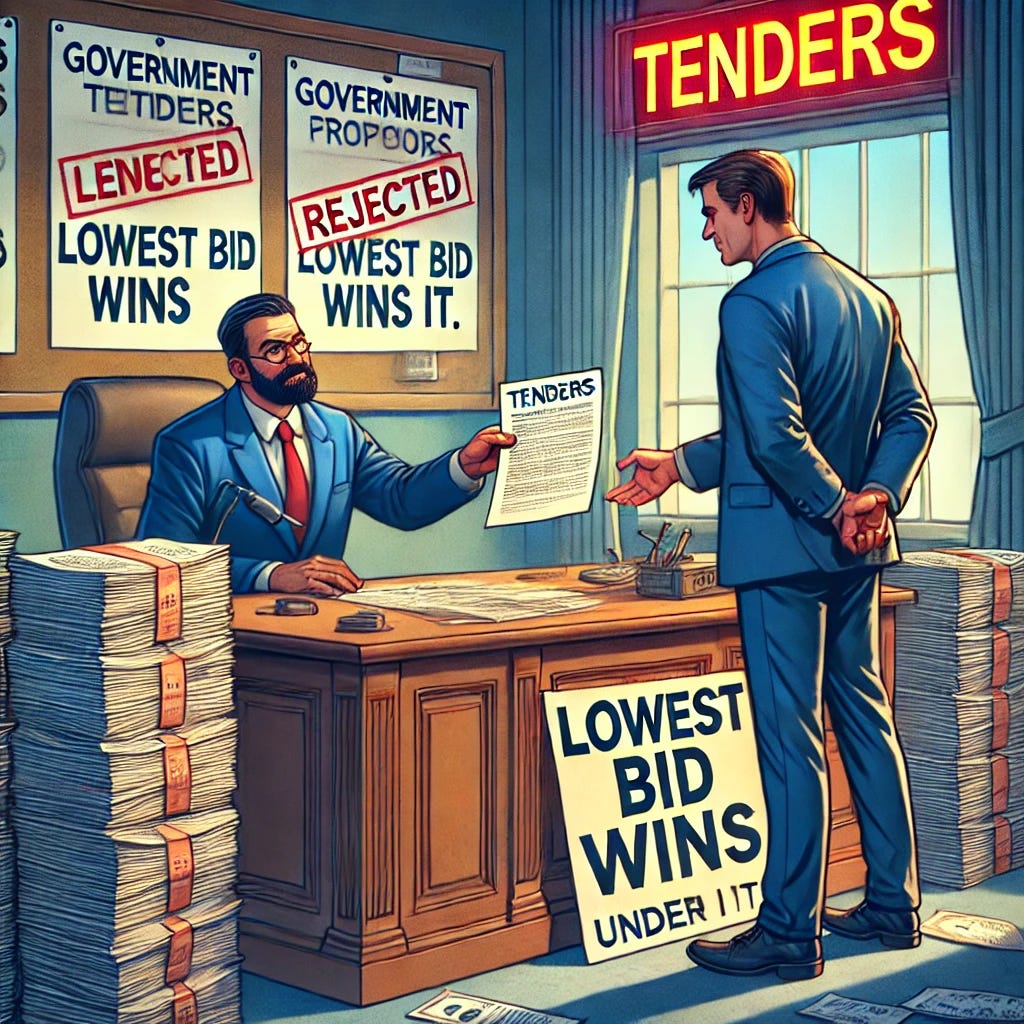Why government tenders don’t work for honest businesses?
and some business lessons
Hey guys, today I am in the mood to open up about my own business experience.
Spoiler: It’s worse than you would expect.
But I still want to share it so that y’all can learn the harsh truth. I don’t intend to discourage entrepreneurs, but this is more like a cautionary tale.
So, let’s get started…
I have broken down the whole incident 5 parts for your understanding#1. The illusion of opportunity
In 2014, the Government of India introduced an online bidding process for tenders, aiming for transparency and fair competition.
Sounds great, right?
Except for those who genuinely want to do business the right way, this system is almost useless.
Let’s break down why.
What was this process about?
1. The Indian government launched an online bidding system via the Central Public Procurement Portal (CPPP) to enhance transparency and fair competition.
2. It was designed to eliminate corruption and ensure equal opportunities for all bidders.
3. And CPPP is a centralized platform for procurement information across various ministries and departments.Anyway…
A few months ago, I visited a Section Engineer’s office in Indian Railways, hoping to understand how contractors get paid. There, I met an Assistant Engineer who openly criticized his own department:
“All these item rates are ridiculously low. How do contractors even survive?”
The answer?
They don’t unless they play the game of bribery. The government deliberately sets low rates, forcing contractors to bid at unsustainable prices. The only way to make a profit is through subpar workmanship or paying bribes.
#2. The political game
Most politicians in India run proxy businesses.
Take Madhya Pradesh, for instance. A former Chief Minister’s brother-in-law owns a massive construction company that mysteriously wins contracts all over the country.
A top NHAI official I spoke to admitted that even he was baffled by their nationwide monopoly.
For businesses without political connections, the odds of securing a project are almost zero.
#3. Manipulated project costs
A friend of mine works at WAPCOS, a government-owned water consultancy. He once revealed that the minister controlling their projects has the power to tweak budgets as he pleases.
“The department pays Assistant Civil Engineers ₹2.5 lakh/month. Does that sound normal to you?”
Not unless you’re laundering money.
This unchecked power lets officials inflate costs, siphoning off public funds while maintaining a façade of legitimacy.
#4. A secret government to please
Recently, I met a top IAS officer from Madhya Pradesh.
Turns out, he has a secret base in another state where he hosts influential guests seeking ‘favors.’ He’s essentially running his own parallel government.
With strong political ties, he can ‘bless’ projects and bend rules at will. What does he gain?
Power, influence, and most importantly, wealth. And despite his obvious corruption, he’s not even on the tax department’s radar.
#5. On-ground reality
Excited to take on a major project, I hired workers from Uttar Pradesh. But their living conditions at the labor camp were horrifying:
Rats the size of cats
Filthy toilets
Contaminated drinking water
Open garbage dumps
Despite repeated complaints, no action was taken. Eventually, my workers abandoned the project, vanishing overnight with the money I had invested in them. It was heartbreaking.
To make things worse, my ‘classmate’ who got me this project? His only contribution was collecting his commission. I never even saw him at the site.
So, why can’t honest businesses survive in India?
I don’t have lavish dreams. I just want a small, ethical business that treats employees well. But when I discuss this with my family of retired government employees, they laugh:
“You have to be unethical to make money in India.”
This mindset is the biggest roadblock for people like me. Even my business partner was useless. HE was more focused on buying cars and flaunting wealth than actually working. I had to cut him loose.
The lessons I have learned so far…
Choose business partners wisely Time > Money. See how many hours your partner can actually commit.
Keep majority control (e.g., 51-49) for decision-making power.
Observe them for 3 months. If they don’t perform, show them the door.
Don’t rely on others for projects If someone brings you a project, they’ll expect something in return.
Build direct connections with clients on LinkedIn and other platforms.
Avoid ‘free advisors’ People who only give advice but never help? Not worth your time.
It’s never too late to start Ignore negativity. Learn from advice, but trust your gut.
Know when to move on If something isn’t working, don’t force it. Time is precious.
So, that’s it for today. If you enjoyed this edition, subscribe to hear from us every day!
See ya 👋



I am working in Infra Consulting with many of these government executing agencies. I can resonate really well with the article and I can assure that it is more grimmer than mentioned in the Article. Thanks for the article.